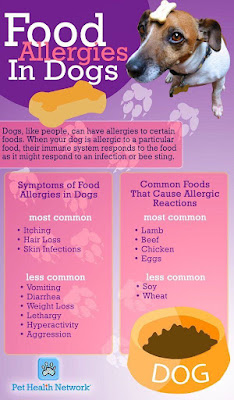Dogs with allergies are just like people with allergies. It's hard to miss the connection, doesn't it? The two situations look completely different, and yet the ways that we look at them can make the difference between a healthy and happy pet and one that's miserable, lonely, and uncomfortable. The same is true when it comes to dogs with allergies symptoms.
Let's think of dogs as humans with allergies. Like us, they're always living with some kind of environmental stress or stressor. They're always sniffing around, digging for bugs or worms, and generally being an active, nervous, and unhappy creature. The same is true of humans with allergies. Some people have allergic reactions to pollen and other irritants in the air. Others have allergic reactions to chemicals in the home, foods, and medications.
My dog, Auntie Moo, suffers from seasonal allergies caused by parasites and dust mites. She has to be indoors most of the year because of those things. Most of the time, when my husband, Ken, sees her he goes out in search of ways to cure her.
Because dogs are exposed to the same allergens and irritants as humans, they too have a tendency to suffer allergic reactions. Sometimes they suffer more than humans do. Dogs with allergies will have itchy eyes, scratchy skin, coughing, runny nose, sneezing, and teary eyes. At times, there may even be an allergic reaction to the flea bite.
There are all natural remedies available for dogs with allergies symptoms. Some natural remedies work better than others. Many allergy sufferers have had great results using a combination of natural remedies and conventional treatment. In addition, many dogs with allergies don't necessarily need to be on medication. There are a number of ways to cure them at home.
There are some conventional allergy treatments available for dogs with allergies symptoms. One way is called corticosteroid injections. They are injected directly into the dogs' joints. Another is called desensitization shots. These are shots that slowly expose the dog to the offending allergen or insect bites over a period of weeks or months.
While some dogs with allergies like to remain indoors, others must get outdoors to enjoy the fresh air. There are also several different breeds of dogs like German shepherds, collie dogs, golden retrievers, etc., that have this problem. If your pooch gets allergies like these, it's imperative that you take him or her outside often. And don't forget to take him or her to the vet for regular checkups.
Along with regular checkups and treatment of allergies, there are several food allergy treatments for dogs that can help alleviate the symptoms. These include hypoallergenic dog food that's specially formulated to minimize the negative effects of dogs with allergic reactions. It should also have ingredients like lamb, rice and oats. Such foods not only prevent the harmful effects of these allergens but also keep the immune system strong and healthy.
There are several ways you can reduce the chances of having dog allergy symptoms. The first step is to be aware of the allergen in your pet's environment. This includes dust and pollen from grass, trees, flowers, weeds and the like. Regular bathing and shampooing of your pet will help you detect the first signs of allergies. In fact, if you're not able to spot allergens on your pooch immediately, it's okay to subject him or her to a desensitizing spray before you discharge him or her outside.
Just like humans, dogs without allergies may also experience dry mouth. Such dogs will lick their tongues constantly as a result of frequent licking of the lips. Desensitizing sprays will make licking your dogs' lips easy and safe.
Another way to treat dogs without allergies is through topical and oral antihistamines. Oral antihistamines reduce histamine release by calming the body's nervous system. Topical antihistamines are similarly useful. These types of medication are best administered orally, because they can be absorbed through the skin and mucous membranes. However, they too can cause skin and mucous membrane allergies in dogs with allergies.
If neither of the previous two options work, then you may want to consider getting your dog tested for other possible causes of allergies in dogs. For instance, a chronic ear infection can trigger allergies. Other possible causes include flea bites and food allergies. Once you have determined the exact cause of the allergies in your dog's, you can easily treat them. Dogs with allergies symptoms can become so miserable that you may feel compelled to give them the best care there is - which is why it's very important to understand dogs and know how to care for them properly.
